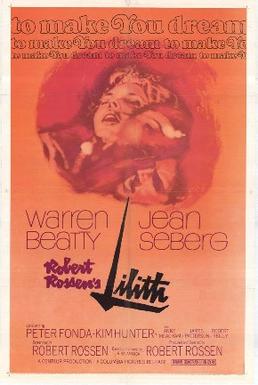
Please follow us on Gab, Minds, Telegram, Rumble, Truth Social, Gettr, Twitter
Turner Classic Movies occasionally runs the 1964 film Lilith. It always reminds me of the church summer festivals of the past. Not that most church summer festivals are anything like the one shown in Lilith. Based upon the novel by J.R. Salamanca, Lilith depicts a young woman afflicted with schizophrenia and the dangerous spell she casts on those around her. Keats' poem about the "beautiful lady without pity" figures prominently in the book, which explores the mystery of mental illness in far greater depth than does the film. The film is also heavy with nihilism as opposed to the pure tragedy of the novel. Although I must say that Jean Seberg was perfectly cast as the dangerous and beguiling Lilith, possessing the right balance of spritely charm and flaky malevolence needed for such a role.
There are not many films about Maryland, and even fewer that were filmed in Maryland. Both the book and film Lilith take place in Rockville, Maryland, just down the road from where I grew up. The movie was filmed on location in Rockville; it is fascinating to see what the town looked like before it became a parking lot for Washington, D.C. commuters. The festival scene was shot at an actual parish picnic, that of St. Mary's Catholic Church in Barnesville, Maryland, which is also the site for the drama of the novel. I used to attend that particular picnic in the early 80's and once helped with serving the turkey dinner. There is still a picnic there every summer, which includes a turkey dinner and a jousting match. Whenever Lilith is on TCM or Prime, I watch for the glimpse of my friend Joanie's mother, who was caught on film, standing under a tree watching the jousting tournament with some other local people. Jousting is the official state sport of Maryland and figures prominently in the plot of Lilith. It is amid the wholesomeness of the picnic that Lilith's depravity is first exposed, but Vincent, the protagonist played by Warren Beatty, is too smitten to notice, and soon after falls under her thrall.
Most of action of book and film takes place at Chestnut Lodge, renamed Poplar Lodge, a famous clinic for the mentally ill and a landmark in Rockville. The Lodge we see on film is actually the Killingworth-Taylor estate, located in Locust Valley, NY. The character Vincent is a young Korean War veteran who goes to work as an aid at the clinic. Although he has no formal training, Vincent sincerely wants to help the patients, and his concern and empathy win him the trust of the doctors. He is permitted to take the seriously ill Lilith on outings, and she appears at first to be making progress in his care.
Unfortunately, the doctors and Vincent himself underestimate Lilith's bewitching and seductive charm. They are disarmed by her childlike and innocent manner. So is the viewer/reader likewise deceived, even to the extent that one begins to question if she is really insane at all. Lilith, however, is genuinely psychotic. Vincent betrays his trust and becomes sexually involved with her. Once Vincent becomes her lover, he also becomes her slave, which means playing into her derangement rather than foiling it. The more she indulges her whims, the more divorced she becomes from reality, dragging others along with her into the pit.
What is remarkable about the story is that Lilith's various aberrant behaviors, which in 1964 were considered quite shocking and indicative of her madness, are things which now certain segments of society are trying to convince us are normal. Her narcissism, her self-deification, her lack of boundaries (especially where sexuality is concerned) are traits which, when combined, once put someone in the mental hospital. Today such conduct is regarded by some as part of having a free spirit. It raises the question as to whether an entire society can degenerate into psychosis. If so, then increased self-indulgence is clearly not the path to healing....